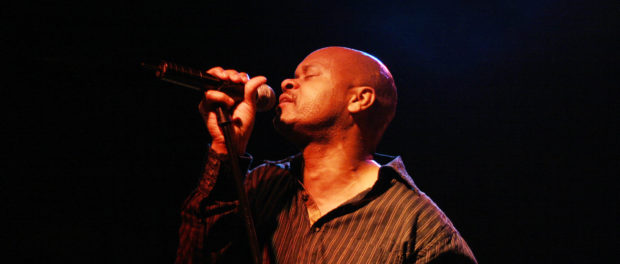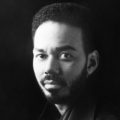Blessid Union Of Souls, “I Believe” inspire again on “Home 25” vinyl
 Photo by Andy Argyrakis
Photo by Andy Argyrakis
In the 25 years since Blessid Union Of Souls released its breakout album, “Home,” the soulful rock group’s relevance has only grown, especially when it comes to the gripping piano ballad, “I Believe.”
The chart-topper in the UK, Asia and America could’ve very well been released today, both musically and thematically, as it chronicles singer/songwriter Eliot Sloan’s brave social commentary on violence, drugs, materialism and personally facing extreme prejudice because of an interracial romance, yet ultimately insisting “love will find a way.”
That’s not even taking into account subsequent singles such as “Let Me Be The One,” “I Wanna Be There” and “Hey Leonardo (She Likes Me For Me),” major soundtrack slots on “Pokémon: The First Movie” and “Ace Ventura: When Nature Calls,” or tours with Bon Jovi, Goo Goo Dolls and Third Eye Blind.
Despite covering so much ground on CD and during the early days of downloading, this anniversary finds the band embarking on another first when “Home 25” earns a limited edition vinyl pressing that’s stocked with vintage live recordings, demos and rarities.
To mark the occasion, Chicago Concert Reviews got the front man/founder to thumb through his childhood record collection, while touching on everything from the platinum project, to eradicating racism and what’s coming around the corner for Blessid Union Of Souls.
Does it feel like 25 years have passed by since the original release?
 Eliot Sloan: No, not really. The memories of those days are still pretty vivid. It’s kind of like both. It feels like yesterday when I look at videos from that era, but at the same time, it seems like a lifetime ago, almost like I’m looking at someone else when I see that guy with the dreadlocks and the 30-inch waistline!
Eliot Sloan: No, not really. The memories of those days are still pretty vivid. It’s kind of like both. It feels like yesterday when I look at videos from that era, but at the same time, it seems like a lifetime ago, almost like I’m looking at someone else when I see that guy with the dreadlocks and the 30-inch waistline!
What prompted the vinyl decision?
Sloan: When I was approached about it, I honestly didn’t fully respect the magnitude of what was happening. Growing up on vinyl, but coming out in the cassette/CD age, it never occurred to me to see a Blessid “album,” but I’m glad it’s finally happening. It’s only going to be a limited release, probably just a few thousand copies, but I want to make it clear that it is not a re-distribution of the “Home” record. There are songs from that album, but not the original recordings. To me, though, it’s almost better in the sense that there are live tracks and B-sides from those days of recording 30-plus songs to get the final 11 that made the first record. It’s all encompassing in that it captures the spirit of all the music that was being created between ‘92 and ‘95. It was a glorious time.
What do you hope the previously unreleased material adds to the picture?
Sloan: Well, they played a big part actually, even though some of them didn’t make the first record. We had set the bar with songs like “Home,” “Let Me Be The One,” and of course, “I Believe,” so if they didn’t make it on that level, they were put on the back burner. It’s like you don’t know what’s really good if you don’t have anything, not as good, to compare it to.
Can you recall a few of the albums you owned growing up that helped shape “Home”?
Sloan: Goodness, yes. Led Zeppelin’s “Houses Of The Holy” and “Presence,” as well as “The Song Remains The Same” got a lot of play on my turntables over the years growing up in Cincinnati. Add to that Queen’s “A Night At The Opera,” “A Day At The Races,” and “News Of The World,” Elton John’s “Goodbye Yellow Brick Road” and “Caribou,” Prince with “Controversy,” “Purple Rain” and “Sign O’ The Times.” I could go on and on: “Talking Book,” “Songs In The Key Of Life” and “Innervisions” by Stevie Wonder, “Technical Ecstasy” by Black Sabbath. Funny thing is though, as much as those albums helped shape the music I ended up creating, I don’t and haven’t listened to them much at all since we started making records of our own. But they, and many others, were all a huge part of my teenage soundtrack.
 “I Believe” continues to resonate as not only an extraordinary song, but a vital message that seems more relevant than ever. What were you hoping to convey with that track?
“I Believe” continues to resonate as not only an extraordinary song, but a vital message that seems more relevant than ever. What were you hoping to convey with that track?
Sloan: Honestly, I don’t know if we were trying to convey anything when we first released it. We felt like it was a great lead off track to set the tone for the rest of the record. Everything it has accomplished did it on its own merit. We all obviously felt very strong about it, but I personally had no idea of its impact. We were nervously excited about what it would do at radio. In hindsight, I don’t know, it seemed like it would, if nothing else, get someone’s attention long enough to listen to it and give it a shot. But it really struck a nerve, more than any of us expected. Even now when I hear it, it still demands attention, so to speak, with just enough mystery and intrigue in the opening piano to stick around and see if there’s anything worth listening to lyrically.
How was it received when it first came out and has the reaction stayed the same or expanded in the passing years?
Sloan: It’s funny to think about now, but we played it for several record companies before EMI signed us. There was actually one A&R [artists and repertoire] guy from a label out of New York who called our manager to let him know how it was one of the worst songs he’d ever heard and he didn’t know how we ever thought we would get signed. Ironically, no one from our band got our feelings hurt by it. On the contrary, [we] laughed it off and felt like he was missing the point. He was and did. Anyway, to answer your question, it was received, for the most part, very well, from radio to the audience. There was not much like it at the time, so it stood out. It wasn’t your typical ballad, a love song cut from a different mold. Most of all, it was sincere. I think it’s that sincerity that’s made it last all these years.
Did you ever face any challenges being an interracial band at the beginning when it was less common than now or was it a non-issue?
Sloan: No, not really, at least I never witnessed it. We didn’t care anyway. Racism, bigotry, not liking someone because they have different color skin is just plain stupid. Worse than that, it’s demonic and straight from hell. I was a Black kid growing up in a White neighborhood listening to Led Zeppelin, Queen, Aerosmith and Pink Floyd, which surprised a lot of people.
 I guess they were thinking that I was “supposed” to be listening to “Black” music. And don’t get me wrong, I listened to Stevie, Roger & Zapp, Cameo, George Clinton, Curtis Mayfield and The Jackson 5. I had Black and White friends, Black and White girlfriends, and now I have four mixed kids. No one in the band had an issue with any of that kind of stuff because being in a band is light years from anything that’s considered to be normal in society. We had all been exposed to different nationalities all of our lives…
I guess they were thinking that I was “supposed” to be listening to “Black” music. And don’t get me wrong, I listened to Stevie, Roger & Zapp, Cameo, George Clinton, Curtis Mayfield and The Jackson 5. I had Black and White friends, Black and White girlfriends, and now I have four mixed kids. No one in the band had an issue with any of that kind of stuff because being in a band is light years from anything that’s considered to be normal in society. We had all been exposed to different nationalities all of our lives…
How do you feel about America’s path to racial reconciliation, especially in light of this last year? Is it on the right track or is there still a lot of work to be done?
Sloan: “America’s path to racial reconciliation.” Hmmm, I don’t know what that is, meaning what America’s path is because there’s too much division. I do know if we keep saying that racism is a problem, then racism will continue to be a problem. If you put 12 kids in a playground, they’re just going to play with each other in perfect harmony until some stupid grown up comes along and says to them, “hey, see that kid with different color skin? You’re not supposed to like him.” That’s what the media keeps doing, fanning the fire. It’s a low hanging branch for ratings. As to your question “is there still a lot of work to be done?” Yes, always, but on an individual level. We, as individuals, have to constantly make good choices, which is easier said than done, but not impossible.
Beyond “I Believe,” what were some of the other subjects and sounds you were going for on the album?
Sloan: We weren’t even thinking about that. We were just making up songs and the subject matter came naturally. You play a drum track, a guitar lick, a piano chord, and lyrically, whatever comes out, comes out. Even [with] “Nora,” which was a song about my Grandmother, I didn’t sit down and say “I want to write a song about my Grandmother.” I just sat at the piano, played some chords and that’s where it led me. We pretty much approached every song like that.
After the “Home” period was complete, what were some other pivotal points for the group throughout the rest of the ‘90s and 2000s through now?
 Sloan: We went through some personnel changes, which was a bit of a challenge. I don’t know any band in existence that doesn’t carry some animosity within its members. That’s just part of it, though. There have been far more great times than bad. We did a couple of military tours that took us to Germany, Japan, Africa, Bahrain and a bunch of other places. I think, also in 1999 when “Hey Leonardo” came out, that was a bit of a turning point for us. It was a step away from the first two records. There were people who didn’t believe we wrote it or even that I was singing on it. Also, after that point, we had seven songs in the Top 40 and a lot of people didn’t know they all came from the same band. Avril Lavigne’s guitar player came up to me one time after a show and said “you guys are pretty good, but let me ask you something. How come all you do are cover songs?”
Sloan: We went through some personnel changes, which was a bit of a challenge. I don’t know any band in existence that doesn’t carry some animosity within its members. That’s just part of it, though. There have been far more great times than bad. We did a couple of military tours that took us to Germany, Japan, Africa, Bahrain and a bunch of other places. I think, also in 1999 when “Hey Leonardo” came out, that was a bit of a turning point for us. It was a step away from the first two records. There were people who didn’t believe we wrote it or even that I was singing on it. Also, after that point, we had seven songs in the Top 40 and a lot of people didn’t know they all came from the same band. Avril Lavigne’s guitar player came up to me one time after a show and said “you guys are pretty good, but let me ask you something. How come all you do are cover songs?”
In terms of concerts, do any stand out in or around Chicago?
Sloan: We used to play in Naperville on 4th of July, which was always great. One year, we were about to hit the stage when it started to thunder. After about 20 minutes of that, and some rain and lightning, the show was cancelled. [A half hour] later, the storm had passed and it was a beautiful day, but at that point, it was too late. We were so bummed about that.
What’s next for Blessid Union Of Souls?
Sloan: We just released a Christmas EP called “A Blessid Christmas,” which contains three originals that I co-wrote with two superb songwriters in Nashville, Bill DiLuigi and Shay Watson. Also, during this somewhat of a lockdown year, I managed to record two different duets of “I Believe,” one with an artist from Germany named Ewane Makia, and another with a female singer in Nashville named Deanna Loveland, as well as two different music videos, all of which will be released in 2021. At the end of the day, I just keep trying to find ways to be creative. It’s still fun to me.
For additional information on Blessid Union Of Souls, visit BlessidUnionOfSouls.net.








